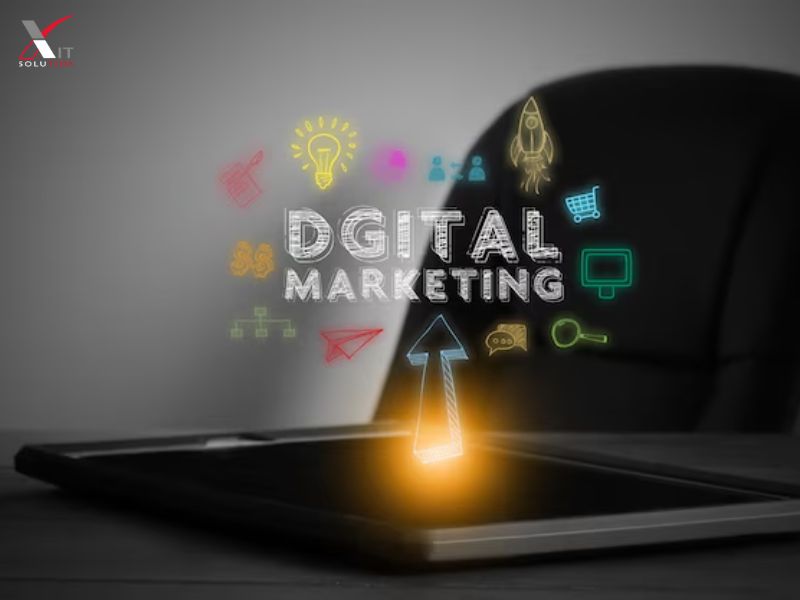What is the Relationship Between Social Media and Digital Marketing?
What is the Relationship Between Social Media and Digital Marketing? Social media and digital marketing have transformed the way businesses connect with their audiences. Together, they create a dynamic, multifaceted strategy for brand visibility, customer engagement, and conversion. In this blog post, we’ll delve into the interplay between social media and digital marketing, uncovering how they complement each other and contribute to the success of modern marketing efforts.
What is the Relationship Between Social Media and Digital Marketing?
The Role of Social Media in Digital Marketing
Social media is a subset of digital marketing, which encompasses all online marketing efforts. Platforms like Facebook, Instagram, Twitter, LinkedIn, TikTok, and Pinterest have become indispensable tools for marketers to achieve their objectives. Social media’s role within digital marketing includes:
- Brand Awareness: Social media platforms provide businesses with unparalleled opportunities to reach diverse audiences. By posting regular, relevant content, brands can boost their visibility and reinforce their identity.
- Interaction: Social media provides a platform for businesses and customers to engage in two-way communication. Comments, likes, shares, and direct messages create a space for meaningful interactions that can strengthen relationships.
- Data and Analytics: Social platforms offer detailed insights into user behavior, engagement metrics, and audience demographics. This data informs strategies, helping marketers fine-tune their campaigns.
What is the Relationship Between Social Media and Digital Marketing?
How Social Media Amplifies Digital Marketing
Social media serves as a catalyst for digital marketing, enhancing its reach and impact in various ways:
1. Driving Traffic to Websites
Effective social media marketing directs users to a brand’s website through links, promotions, and engaging content. For instance, a well-crafted Instagram ad or Facebook post with a call-to-action (CTA) can funnel users directly to a landing page.
2. Boosting Content Marketing
Social media platforms are ideal for sharing blog posts, videos, infographics, and other content marketing materials. By promoting these assets, businesses can amplify their visibility and increase shares and engagement.
3. Facilitating Influencer Partnerships
Influencers play a significant role in digital marketing. Social media platforms act as a meeting ground for brands and influencers, enabling collaborations that can expand reach and improve brand credibility.
What is the Relationship Between Social Media and Digital Marketing?
Digital Marketing Strategies Enhanced by Social Media
Digital marketing encompasses various strategies, including search engine optimization (SEO), pay-per-click (PPC) advertising, email marketing, and content marketing. Social media complements these strategies by:
- Improving SEO: Social signals like shares and likes can indirectly improve search engine rankings by increasing content visibility and encouraging backlinks.
- Optimizing PPC Campaigns: By running social media ads alongside Google Ads, marketers can create a cohesive advertising strategy, leveraging retargeting to boost conversions.
- Enhancing Email Marketing: Social media can help grow email lists by promoting lead magnets or sign-up forms. For example, running a contest on Facebook that requires users to subscribe to a newsletter can increase email subscribers.
What is the Relationship Between Social Media and Digital Marketing?
Key Benefits of Integrating Social Media and Digital Marketing
1. Wider Audience Reach
Social media platforms host billions of users worldwide. Integrating social media with digital marketing ensures businesses can target niche markets as well as broader audiences.
2. Cost-Effective Marketing
Social media campaigns often cost less than traditional advertising channels. Combined with digital marketing, brands can achieve significant returns on a relatively small investment.
3. Real-Time Communication
Digital marketing benefits greatly from social media’s ability to facilitate immediate, real-time communication. Brands can respond to queries, address concerns, and build trust in a timely manner.
4. Improved Personalization
With advanced targeting tools, social media enables personalized content delivery. When integrated with digital marketing efforts, this can lead to higher engagement and conversions.
What is the Relationship Between Social Media and Digital Marketing?
Challenges in Combining Social Media and Digital Marketing
Despite its many advantages, merging social media with digital marketing is not without challenges:
- Algorithm Changes: Frequent changes to social media algorithms can impact organic reach.
- Platform Saturation: High competition on social platforms can make it harder for brands to stand out.
- Resource Intensity: Managing multiple social channels alongside broader digital marketing campaigns requires significant time and resources.
What is the Relationship Between Social Media and Digital Marketing?
How Businesses Can Effectively Integrate Social Media with Digital Marketing
To successfully combine social media and digital marketing, businesses should:
- Set Clear Goals: Define measurable objectives, such as increasing website traffic, improving engagement, or boosting sales.
- Choose the Right Platforms: Not every platform is suitable for every business. For example, B2B companies may benefit more from LinkedIn, while B2C brands often find success on Instagram or TikTok.
- Maintain Consistency: Align messaging across social media and other digital marketing channels to create a cohesive brand identity.
- Leverage Analytics: Regularly monitor analytics to assess performance and make data-driven decisions.
What is the Relationship Between Social Media and Digital Marketing?
Social Media and Digital Marketing Trends to Watch
1. Video Content Dominance
Platforms like TikTok, YouTube, and Instagram Reels have cemented video content as a top-performing format. Businesses should focus on creating short, engaging videos that align with their digital marketing goals.
2. Artificial Intelligence (AI) Integration
AI tools are increasingly being used to analyze data, personalize content, and automate tasks in both social media and digital marketing.
What is the Relationship Between Social Media and Digital Marketing?
3. Social Commerce
The rise of social commerce, where users can shop directly on platforms like Instagram and Facebook, highlights the importance of integrating e-commerce with social media strategies.
4. Augmented Reality (AR) Features
AR filters and experiences are gaining traction on platforms like Snapchat and Instagram, providing innovative ways for brands to interact with their audience.
What is the Relationship Between Social Media and Digital Marketing?
The Role of Paid Advertising in Social Media and Digital Marketing
Paid social media advertising is a powerful tool for digital marketers. With advanced targeting options, paid ads ensure businesses can reach their ideal customers. Key advantages include:
- Precise Targeting: Platforms like Facebook and LinkedIn allow advertisers to target users based on demographics, interests, and behaviors.
- Measurable ROI: Social media ad platforms provide detailed performance metrics, enabling marketers to calculate their return on investment.
- Retargeting Capabilities: Retargeting ads help businesses reconnect with users who have previously interacted with their brand, increasing the likelihood of conversion.
What is the Relationship Between Social Media and Digital Marketing?
How Social Media Supports Branding in Digital Marketing
Social media is instrumental in building and maintaining a brand’s image. By consistently sharing content that reflects a brand’s values and voice, businesses can:
- Build Trust: Transparent communication fosters trust among followers.
- Enhance Recognition: Consistent use of logos, color schemes, and tone strengthens brand recognition.
- Showcase Expertise: Sharing educational content, such as tips or tutorials, positions a brand as a thought leader.
What is the Relationship Between Social Media and Digital Marketing?
The Future of Social Media and Digital Marketing
The relationship between social media and digital marketing will continue to evolve, driven by advancements in technology and shifting consumer behaviors. Future trends include:
- Increased Personalization: AI-driven insights will enable even more personalized experiences.
- Focus on Community Building: Brands will prioritize creating engaged online communities to foster loyalty.
- Adoption of New Platforms: Emerging platforms will present new opportunities for businesses to connect with audiences.
What is the Relationship Between Social Media and Digital Marketing?
FAQs
What is the main difference between social media and digital marketing?
Social media is a subset of digital marketing focused on using platforms like Facebook, Instagram, and Twitter to engage with audiences, while digital marketing encompasses all online marketing efforts, including SEO, email marketing, and PPC campaigns.
How does social media support digital marketing?
Social media enhances digital marketing by driving traffic, improving engagement, and providing valuable audience insights that inform broader marketing strategies.
Can social media replace traditional digital marketing strategies?
While social media is a powerful tool, it cannot entirely replace traditional digital marketing strategies. Instead, it works best as part of an integrated approach.
What are the most effective social media platforms for digital marketing?
The choice of platform depends on the target audience and business goals. Instagram and TikTok are great for visual content, LinkedIn is ideal for B2B marketing, and Facebook offers broad demographic reach.
How do social media algorithms affect digital marketing?
Algorithms determine content visibility on social platforms. Frequent changes can impact a brand’s reach, making it essential to stay updated and adjust strategies accordingly.
Why is analytics important in social media marketing?
Analytics provide insights into campaign performance, helping businesses optimize strategies, improve engagement, and achieve their marketing objectives.
What is the Relationship Between Social Media and Digital Marketing?
Conclusion
The relationship between social media and digital marketing is symbiotic, with each enhancing the other’s effectiveness. Together, they enable businesses to build brand awareness, engage audiences, and achieve measurable results. As technology and consumer behavior continue to evolve, staying informed and adaptable will be key to maximizing the potential of both social media and digital marketing.








